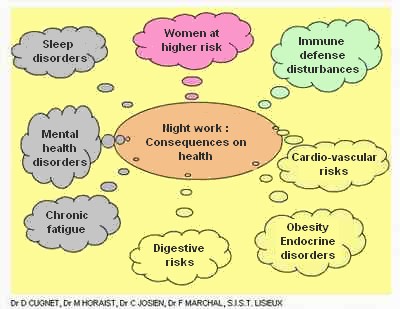Home > Welcome > Sleep-wake pathologies > Know how to sleep > Night work
Night work
Saturday 6 October 2007
All the versions of this article: [English] [français]
Modern society tends to make everybody live with the rhythm of the solitary navigators and airline pilots.
More and more people are thus concerned by that challenge to the laws of Nature.
Some subjects risk, more than others, to « lose their balance » and to present a desynchronization / maladjustment syndrome (or internal chronobiological dissociation).
Read the documentation at the bottom of the page, and the external links for practical advices.
The future no longer belongs to those who get up early ...
The number of night workers increases constantly since the advent of the industrial society and since the use of electricity.

In a remote time, the old phrase was true since almost all human activity stopped when the night came. It was important to get to work from sunrise on.
The people who went to bed late and got up late as well probably had a lot of trouble working in the fields and the general « opprobrium » towards those who slept « too much » during the day can be easily understood.
Those who could fancy to sleep late were, by definition, lazy people, profiteers or thieves...
... Nowadays, 20% of the workers have atypical schedules.
They have to use undeniable individual performances in order not to suffer from a qualitative or quantitative lack of sleep.
"It is possible to reduce one’s sleep time, but it is not possible to reduce one’s need for sleep"

The evening subject has a particular advantage for night work (in a restaurant, as a musician, as a doctor... ) because his/her diurnal sleep remains efficient.
He/she is though penalized when it comes to getting up early in the mornings, according to normal schedules, and presents a contraindication against early morning jobs, because he/she has a lot of difficulty going to bed early enough the evening before.

The morning subject presents a physiological contraindication against night work because he/she is unable to get enough rest in a counter phase to his/her natural rhythm.
After a sleepless night, he/she must wait for the 1 PM dip to be able to fall asleep.
He/she loses thus in average 3 hours of sleep compared to a person who can sleep from the morning on. His/her diurnal sleep is, besides, of a bad quality.
Shift work.
It is a turning work rhythm : (for example : three eight hours shifts) or the schedule is irregular

It poses the same problem as «jet lag». Here, even more than for night work, the ability of the subject to get enough fitful sleep depends on individual abilities and on the respect of the rules of sleep hygiene.
A sleep debt can occur which expresses through memory and character disorders, pains or functional disorders.
The perfect knowledge of the somnications combined with great individual performances allows to endure these, for the organism, abnormal rhythms.

One must, for example, favour sleep in the descending phase of temperature, and « manage » the chronic sleep debt with naps in order to keep a social life in spite of all that.
The solitary navigator on a race is a particular case which requires, more than ever, a perfect knowledge of the rules of chronobiology :
"The most propitious hours for recovery are between 3 and 6 AM, and between 2 and 6 PM. Short periods of sleep of around 15 to 20 minutes also have a beneficial effect « in emergency » to restore a correct level of vigilance."
Very early work.
Going to work before 6 AM is considered like night work in Switzerland (where the regulations on that matter has remained more strict than in the EU) and gives cause to important compensations.
In France, the new government suggests the apprenticeship since 14 years, which induces a too early authorization of night work.
The workers who have to get up very early go against their sleep rhythm because they wake up close to the thermal minimum, when sleepiness is at its maximum.

Awakening and the introduction of « time givers » just after that point on the temperature curve (around 4 AM) has a phase advance effect which naturally tends to make one sleepy earlier in the evening.
In practice, the western life rhythm leads to go to bed later and later and 10 to 20% of our contemporary people suffer therefore of an important sleep debt, responsible for the accidents caused by sleepiness.
NB. Sleepiness is not the same as tiredness and the subjects who are insomniac during the night are generally never implied in accidents (except for those caused by sleeping pills...!)
Night work
Adapting to night work does not only depend on the application of the behavioural rules of sleep hygiene. .
The individual abilities to accept a rhythm opposed to the diurnal nature of the human species are very variable.
- In our opinion, there exist, in many subjects, true contraindications to night work. In practice, they will not be able to adapt and they will have to change jobs within six month, otherwise they will find themselves stopped from work for illness.
- On the opposite, some other subjects show, in that field, really extraordinary skills. These subjects (genetically very short sleepers), can go on with a diurnal sleep (of a bad quality) during their whole career.
Those consult for insomnia when the time has come to sleep during the nights and they need very little sleep...
- Desynchronization/maladjustment syndrome
The question is thus to know how the people who are physiologically ableto adapt to night work do. The advices that have been drawn from their experiences only work with people whose sleep is performing enough to stand an inversion of the sleep phase.The principle is to try to keep normal biological rhythms while inversing the sleep rythm and without building up a sleep debt. "Know how to sleep.
- Keep the rhythm.
- Keep a « normal » meal rhythm during the day.
The meal (taken with the family) will be a strong diurnal signal for the organism which keeps its natural rhythm better that way than if the main meal takes place during the night.
Snacking at night favours weight gain. - The organism is « warmer » in the end of the day; it is interesting to take profit from that pressure rising to practice a bit of exercise before starting to work.
- Exposal to lamps light therapy bulbs, in the evenings in the winter is good to favour arousal (keep the sandman away) and help to delay the thermal minimum towards the end of the night, which, in its turn, will favour sleep after returning from work.
- One must be careful with the coffee he/she takes in the end of work before going back home. Coffee decreases deep sleep and its effects last quite long.
To the opposite of what is seen in practice (the coffee machines run at high speed during the night jobs), coffee should not be taken past midnight.
Coffee taken after the evening meal is sometimes useful to compensate the physiological sleepiness between 2 to 4 AM. - Priority to sleep.

- Chromotherapy glasses
- "Two sleeps are better than one".
Go to sleep as early as possible after the job (avoid to smoke, to start a task, or to have exercise).
(It is preferable to eat in the end of the job before going home).
Diminish the sun stimulation to the maximum before going to sleep (especially in the summer). There exist, since recently, special glasses which filter the arousing components of the spectre of the morning light and enhance the night worker’s falling asleep.)Cf. "Chromo therapy".
It is strongly advised to wake up for lunch around 1 PM and take advantage of the peek of sleepiness around 3 OM to have a second sleep, sous form de a long « preventive » nap of at least 100 minutes (Cf "The nap’s user manual".
If it is possible during the night, it would be good to take advantage from a short nap. A few minutes are enough to compensate a peak of excessive sleepiness.
(You can move the cursors to modify the balance of the system.
The system works fine with Flashplayer 9)
The chaotic movement relates to internal dissociation states encountered in subjects who suffer of adapting poorly to shift work or after jetlag (and also general anaesthesia).The "internal dissociation" is expressed through a complaint of tiredness and/or sleepiness.
Numerous functional disorders seen in general medicine could be rooted in chronobiological disorders of that kind.
(See « the hypo-sleep syndrome").
Move the different cursors with your mouse. Making: G. Tulloue. under FlashPlayer9).All in all
Shift work requires particular individual somnological skills.
The flexible and short sleeping subjects are favoured because they can stand better the sleep debt which shift work always carries with it.
Nb . Such subjects sometimes consult for insomnia when they go back to a normal sleep rhythm because they are genetically unable (constitutive insomnia) to sleep as much as they would like to (conditioning insomnia).
But for these exceptions, adapting to shift work imposes a good knowledge of the rules of sleep regulation.
The subject who wants to control his/her sleep rhythm must perfectly « know how to sleep ».
The "Nap" is a very precious and efficient somnication to compensate the sleep debt inherent to a work rhythm which is not physiological.Think about your chronobiological rhythm with the help of three interactive or downloadable tests :
Evening/morning;
Short or long sleeper;
Flexibility or rigidity of sleep.
- More information...
- Strategies for night workers "The Canadian Sleep Society.
- Advice sheet for the shift work medicine (in French).
- About shift work « the sleep information » (in French).
- A big pdf (111 pages), from the Robert-Sauvé Institute for health and security at work (IRSST) (in French).
- The French Federation for Health at work,shift work (in French).
